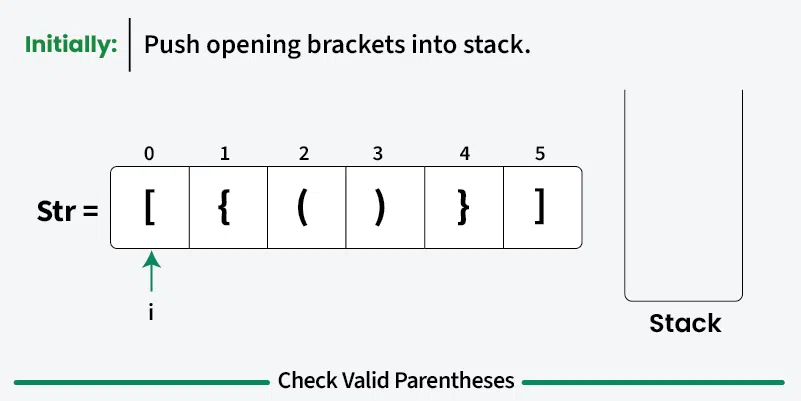Valid Parentheses Problem — Explained with Java Optimizations

✅ Valid Parentheses Problem — Explained with Java Optimizations
The Valid Parentheses problem is a classic question asked in coding interviews and on platforms like LeetCode. The goal is to determine whether a given string containing only brackets (()[]{}) is well-formed, meaning every opening bracket has a matching closing bracket in the correct order.
📌 Problem Statement
Given a string
scontaining just the characters'(',')','{','}','['and']', determine if the input string is valid.
A string is valid if:
- Open brackets must be closed by the same type of brackets.
- Open brackets must be closed in the correct order.
✅ Examples:
| Input | Output | Explanation |
|---|---|---|
"()" | true | Correctly paired |
"()[]{}" | true | All types correctly paired |
"(]" | false | [ is not closed by ] properly |
"([)]" | false | Incorrect nesting |
"{[]}" | true | Properly nested and matched |
🧠 Intuition
We need to:
- Track opening brackets.
- For every closing bracket, check if it matches the last opened bracket.
- If anything mismatches or remains unmatched at the end, the string is invalid.
This is a perfect use case for a stack — Last-In-First-Out (LIFO) structure.
💡 Optimal Stack-Based Java Solution
import java.util.Deque; import java.util.ArrayDeque; class Solution { public boolean isValid(String s) { Deque<Character> stack = new ArrayDeque<>(); for (char c : s.toCharArray()) { if (c == '(') stack.push(')'); else if (c == '{') stack.push('}'); else if (c == '[') stack.push(']'); else { if (stack.isEmpty() || stack.pop() != c) return false; } } return stack.isEmpty(); } }
✅ Time & Space Complexity
| Aspect | Complexity |
|---|---|
| Time | O(n) |
| Space | O(n) |
We scan the string once and use a stack that can hold up to n characters.
🔥 Ultra-Optimized Java (No Boxing, Fastest)
If you're aiming for 0ms on LeetCode and avoiding Java collection overhead, use a raw array:
class Solution { public boolean isValid(String s) { char[] stack = new char[s.length()]; int top = -1; for (char c : s.toCharArray()) { if (c == '(' || c == '{' || c == '[') { stack[++top] = c; } else { if (top == -1) return false; char open = stack[top--]; if ((c == ')' && open != '(') || (c == '}' && open != '{') || (c == ']' && open != '[')) { return false; } } } return top == -1; } }
🚀 Why this is faster:
- No
Characterobject boxing/unboxing. - No
Dequeor method call overhead. - Tight loop with primitive types.
🤔 Why Some Submissions Show 0ms?
You're not alone if you wonder: Why does someone get 0ms and I get 2ms?
It's due to:
- Execution environment randomness.
- JVM warm-up time.
- Input size/load on LeetCode server.
- Java timer granularity (below ~1ms rounds to 0ms).
So don’t worry — your algorithm is already optimal.
🧪 Test Cases to Try
System.out.println(isValid("()")); // true System.out.println(isValid("()[]{}")); // true System.out.println(isValid("(]")); // false System.out.println(isValid("([)]")); // false System.out.println(isValid("{[]}")); // true System.out.println(isValid("")); // true (empty is valid) System.out.println(isValid("(((((")); // false
📚 Conclusion
- Use a stack to track brackets.
- Optimize with
ArrayDequeorchar[]based on performance needs. - You can’t do better than O(n) — that’s the lower bound for reading all characters.
✅ If you're using the array-based method above, you're already at peak efficiency.
🔁 Related Posts
If you enjoyed this post, you might also find these helpful:
- How to Use AI Tools for Novel Writing: Worldbuilding, Characters, and Plots
- Creating Stunning Business Presentations in Under 10 Minutes with AI Tools like Tome or Gamma
- Top 5 AI-Powered Interior Design Tools to Visualize Room Layouts and Color Schemes
- GitHub Copilot vs. Tabnine vs. Claude AI: A Comprehensive Code Assistant Comparison
🚀 Explore More & Work With Us
🔧 Try Our Free Tools
We believe in empowering creators and developers. Here are some completely free tools we've built that might help you:
- Meme Generator – Create and customize memes with our easy-to-use tool.
- QR Code Generator – Generate custom QR codes for websites, contact info, and more.
- Markdown to HTML Previewer – Live preview your markdown as responsive HTML.
More tools coming soon on GILASA GROUP
💼 Hire Us for Custom Software Development
Whether you're looking to build a custom website, AI tool, or full-fledged SaaS product, our expert team is here to help.
👉 Work With Us – Let’s build something amazing together!